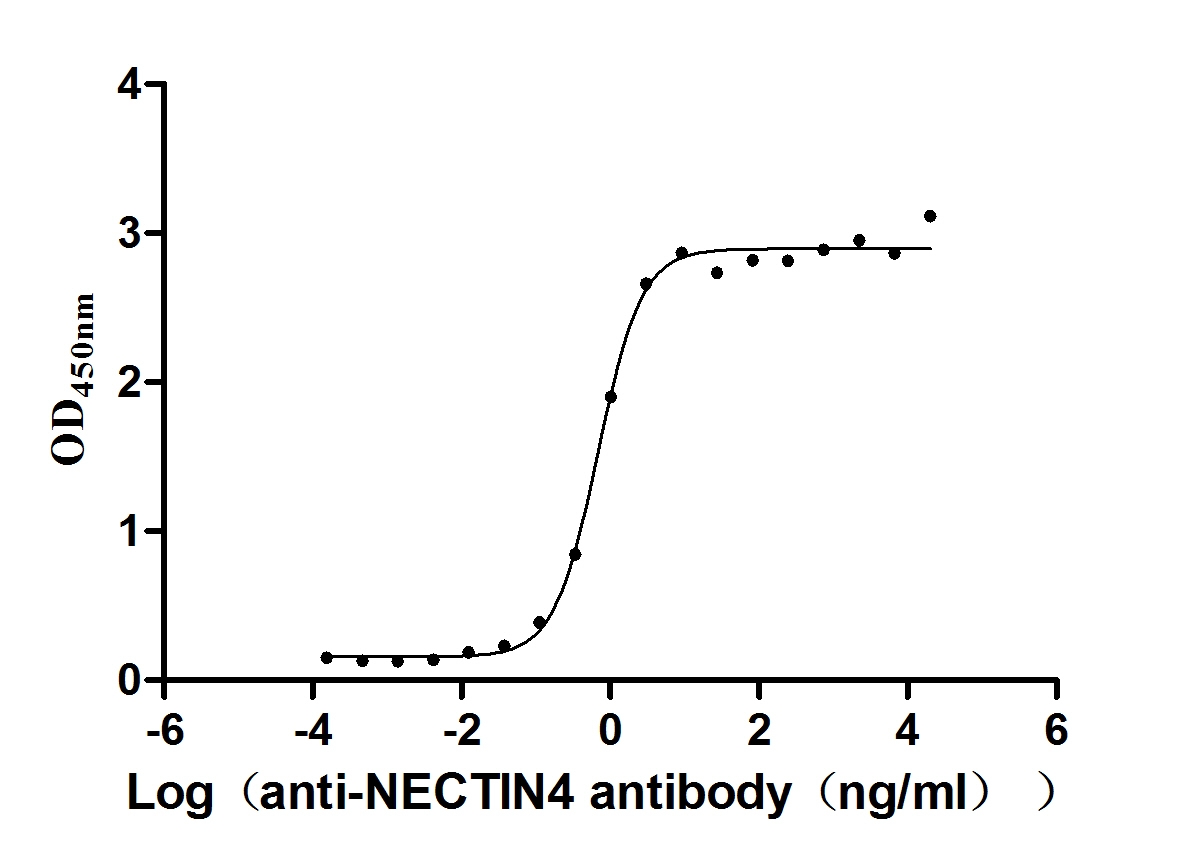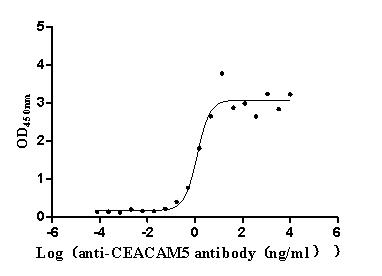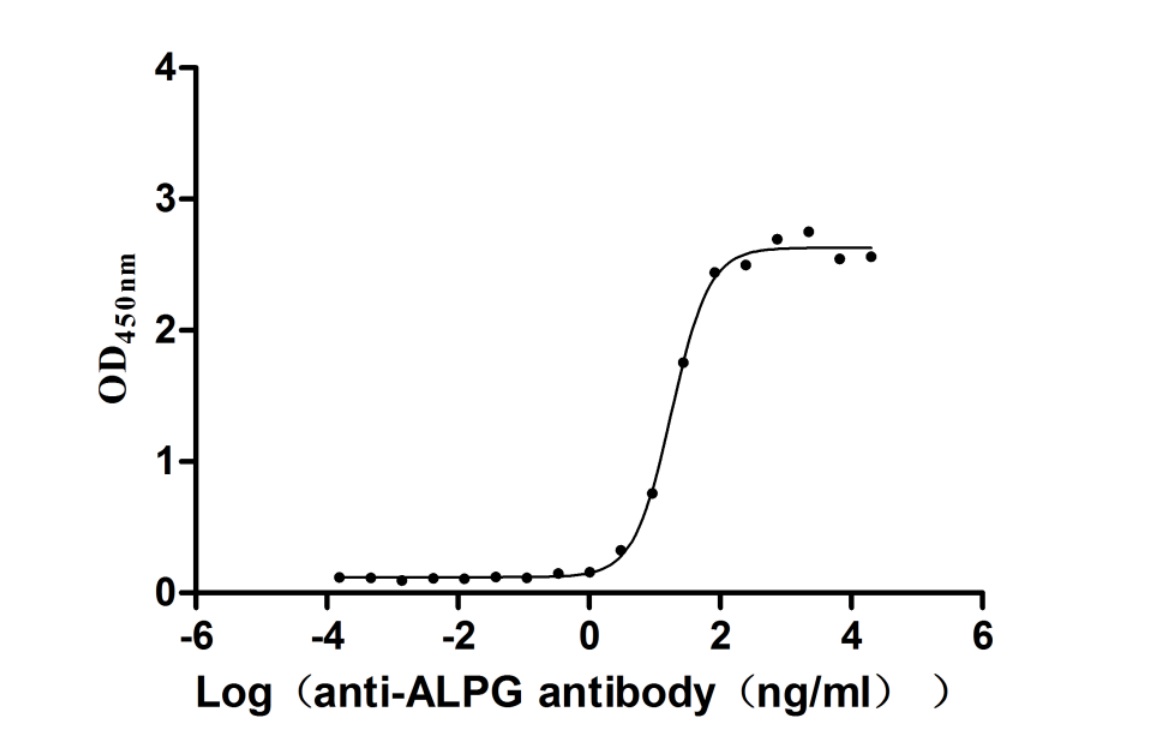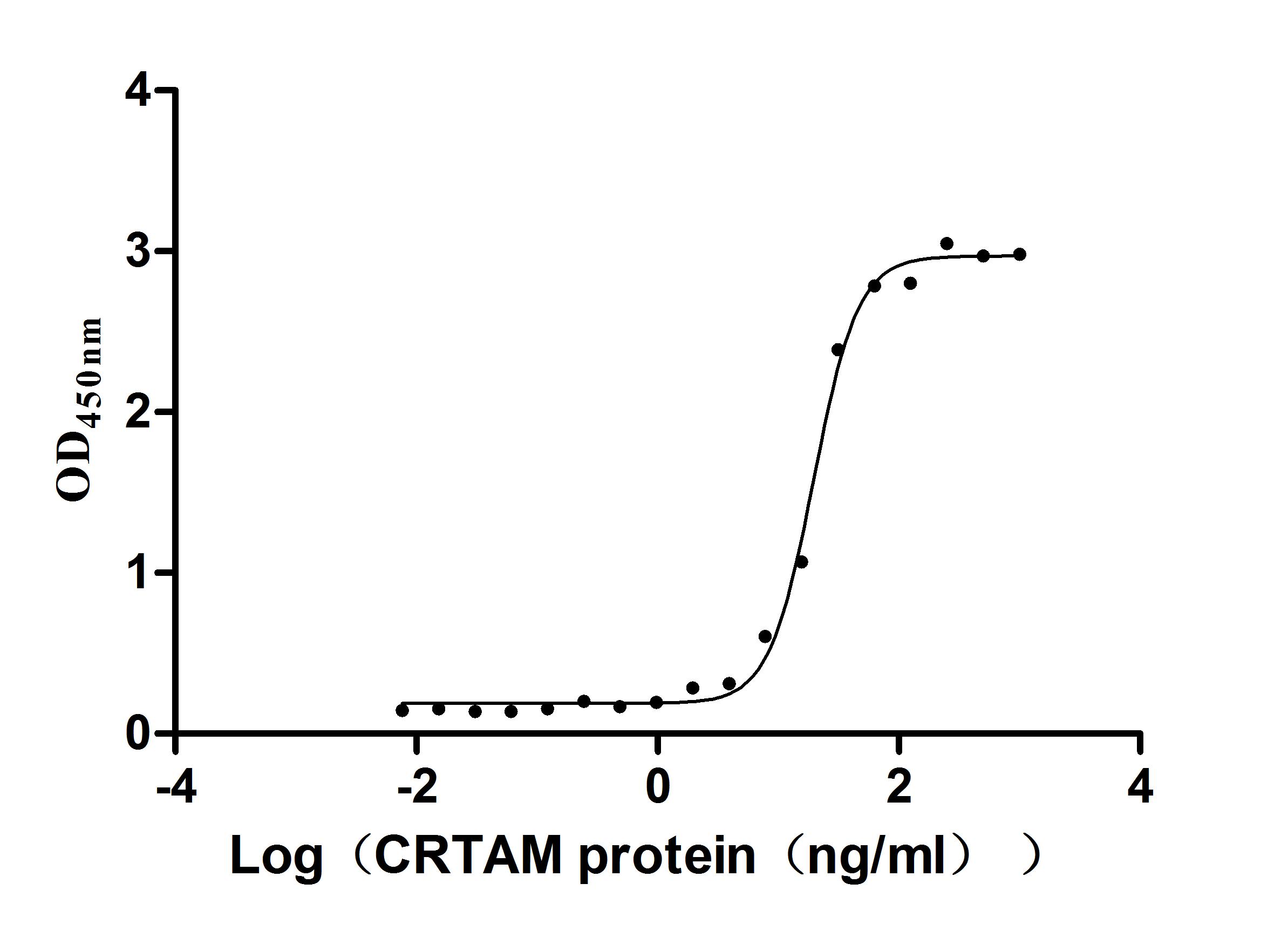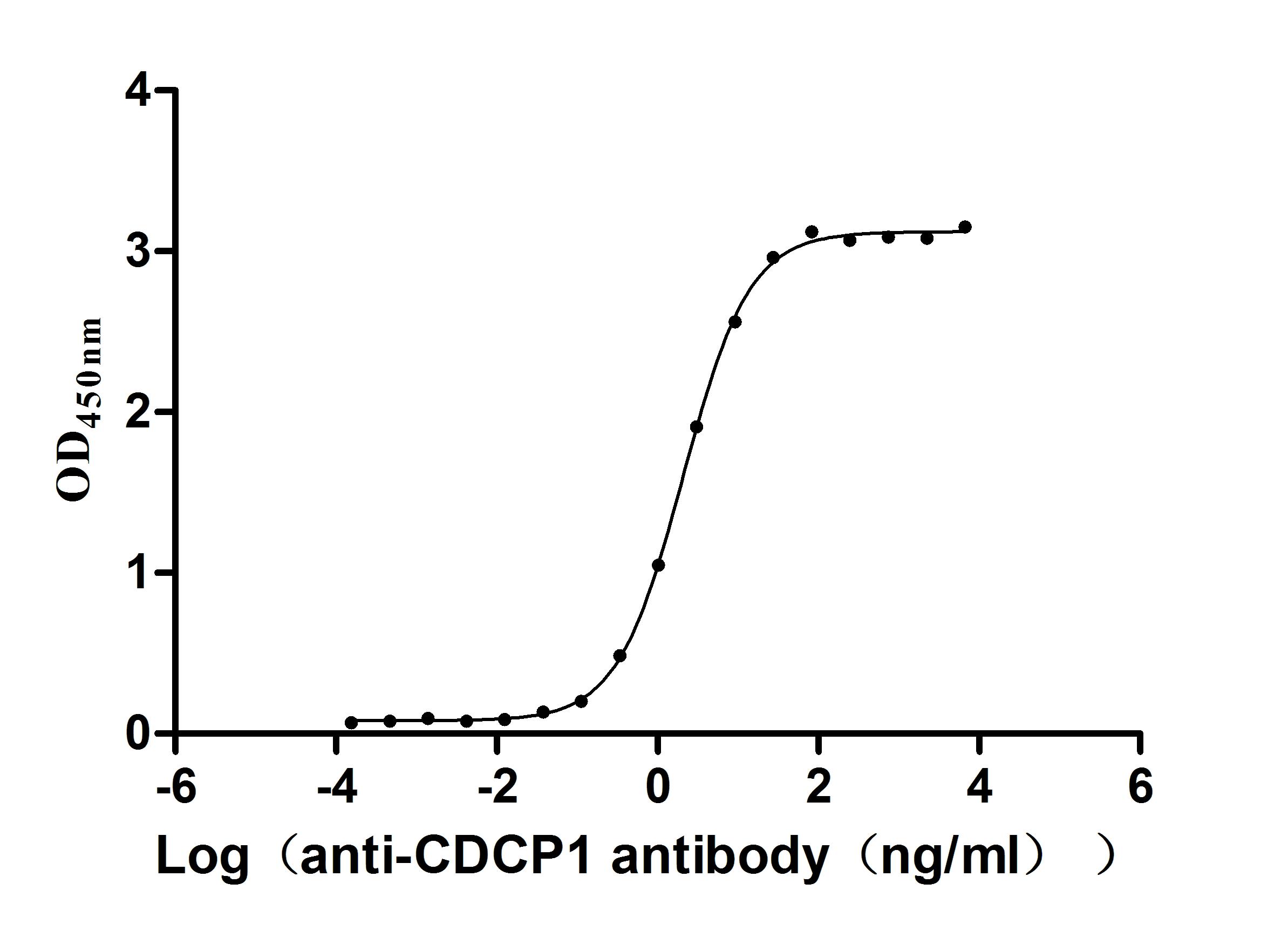Recombinant Human DNA ligase 4 (LIG4), partial
-
中文名称:人LIG4重组蛋白
-
货号:CSB-YP012932HU
-
规格:
-
来源:Yeast
-
其他:
-
中文名称:人LIG4重组蛋白
-
货号:CSB-EP012932HU
-
规格:
-
来源:E.coli
-
其他:
-
中文名称:人LIG4重组蛋白
-
货号:CSB-EP012932HU-B
-
规格:
-
来源:E.coli
-
共轭:Avi-tag Biotinylated
E. coli biotin ligase (BirA) is highly specific in covalently attaching biotin to the 15 amino acid AviTag peptide. This recombinant protein was biotinylated in vivo by AviTag-BirA technology, which method is BriA catalyzes amide linkage between the biotin and the specific lysine of the AviTag.
-
其他:
-
中文名称:人LIG4重组蛋白
-
货号:CSB-BP012932HU
-
规格:
-
来源:Baculovirus
-
其他:
-
中文名称:人LIG4重组蛋白
-
货号:CSB-MP012932HU
-
规格:
-
来源:Mammalian cell
-
其他:
产品详情
-
纯度:>85% (SDS-PAGE)
-
基因名:LIG4
-
Uniprot No.:
-
别名:DNA ligase IV ATP dependent; DNA joinase; DNA ligase 4; DNA ligase IV; DNA repair enzyme; DNLI4_HUMAN; LIG 4; LIG4; LIG4S; Ligase IV; Ligase IV DNA ATP dependent; Polydeoxyribonucleotide synthase [ATP] 4; Polydeoxyribonucleotide synthase 4; Polydeoxyribonucleotide synthase; Polynucleotide ligase; Sealase
-
种属:Homo sapiens (Human)
-
蛋白长度:Partial
-
蛋白标签:Tag type will be determined during the manufacturing process.
The tag type will be determined during production process. If you have specified tag type, please tell us and we will develop the specified tag preferentially. -
产品提供形式:Lyophilized powder
Note: We will preferentially ship the format that we have in stock, however, if you have any special requirement for the format, please remark your requirement when placing the order, we will prepare according to your demand. -
复溶:We recommend that this vial be briefly centrifuged prior to opening to bring the contents to the bottom. Please reconstitute protein in deionized sterile water to a concentration of 0.1-1.0 mg/mL.We recommend to add 5-50% of glycerol (final concentration) and aliquot for long-term storage at -20℃/-80℃. Our default final concentration of glycerol is 50%. Customers could use it as reference.
-
储存条件:Store at -20°C/-80°C upon receipt, aliquoting is necessary for mutiple use. Avoid repeated freeze-thaw cycles.
-
保质期:The shelf life is related to many factors, storage state, buffer ingredients, storage temperature and the stability of the protein itself.
Generally, the shelf life of liquid form is 6 months at -20°C/-80°C. The shelf life of lyophilized form is 12 months at -20°C/-80°C. -
货期:Delivery time may differ from different purchasing way or location, please kindly consult your local distributors for specific delivery time.Note: All of our proteins are default shipped with normal blue ice packs, if you request to ship with dry ice, please communicate with us in advance and extra fees will be charged.
-
注意事项:Repeated freezing and thawing is not recommended. Store working aliquots at 4°C for up to one week.
-
Datasheet :Please contact us to get it.
相关产品
靶点详情
-
功能:DNA ligase involved in DNA non-homologous end joining (NHEJ); required for double-strand break (DSB) repair and V(D)J recombination. Catalyzes the NHEJ ligation step of the broken DNA during DSB repair by resealing the DNA breaks after the gap filling is completed. Joins single-strand breaks in a double-stranded polydeoxynucleotide in an ATP-dependent reaction. LIG4 is mechanistically flexible: it can ligate nicks as well as compatible DNA overhangs alone, while in the presence of XRCC4, it can ligate ends with 2-nucleotides (nt) microhomology and 1-nt gaps. Forms a subcomplex with XRCC4; the LIG4-XRCC4 subcomplex is responsible for the NHEJ ligation step and XRCC4 enhances the joining activity of LIG4. Binding of the LIG4-XRCC4 complex to DNA ends is dependent on the assembly of the DNA-dependent protein kinase complex DNA-PK to these DNA ends. LIG4 regulates nuclear localization of XRCC4.
-
基因功能参考文献:
- Cells doubly deficient in Pol theta; and Lig4 exhibit 100% gene-targeting efficiency because of virtually no random integration events. PMID: 28695890
- These studies provide a scaffold for defining impacts of LigIV catalytic core mutations and deficiencies in human LIG4 syndrome. PMID: 29980672
- study demonstrated that there was an association between DNA ligase 4 Thr9Ile polymorphism and male infertility and suggests CT genotype as a risk factor for male infertility PMID: 28991497
- An increased frequency of binucleated lymphocytes with micronuclei was increased in carriers of the T/T genotype of the LIG4 (rs1805388) gene compared to miners harbouring the C/T genotype. PMID: 28992182
- Cellular NHEJ of diverse ends thus identifies the steps necessary for repair through LIG4-mediated sensing of differences in end structure and consequent dynamic remodeling of aligned ends. PMID: 28930678
- This study shown that both ligase IV and XRCC4 may act in concert to modulate the development of glioma. PMID: 27508978
- We demonstrated an association between six previously published single nucleotide polymorphisms (rs15869 [ BRCA2], rs1805389 [ LIG4], rs8079544 [ TP53], rs25489 [ XRCC1], rs1673041 [ POLD1], and rs11615 [ ERCC1]) and subsequent CNS tumors in survivors of childhood cancer treated by radiation therapy. PMID: 28976792
- In a recombinant PNKP-XRCC4-LigIV complex, both the PNKP FHA and catalytic domains contact the XRCC4 coiled-coil and LigIV BRCT repeats. Multipoint contacts between PNKP and XRCC4-LigIV regulate PNKP recruitment and activity within NHEJ. PMID: 28453785
- Data suggest that stimulation of Artemis nuclease/DCLRE1C activity by XRCC4-DNA ligase IV hetero-complex and efficiency of blunt-end ligation are determined by structural configurations at the DNA ends. (XRCC4 = X-ray repair cross complementing 4) PMID: 28696258
- found that the rs228593, rs2267437 and rs1805388 functional polymorphisms probably alter the level of expression of the ATM, XRCC6 and LIG4 genes, respectively, being important in the maintenance of genomic instability in MDS PMID: 27497341
- marked overlap of dyskeratosis congenita with four other genetic syndromes, confounding accurate diagnosis and subsequent management. Patients with clinical features of dyskeratosis congenita need to have genetic analysis of USB1, LIG4 and GRHL2 in addition to the classical dyskeratosis congenita genes and telomere length measurements. PMID: 27612988
- The rs1805388 in LIG4 was associated with increased radioresistance. PMID: 26974709
- LIG4 is highly upregulated in human colorectal cancer cells. PMID: 27009971
- Five novel mutations in LIG4 and a potential hotspot mutation (c.833G > T; p.R278L) in the Chinese population with LIG4 deficiency syndrome were identified. PMID: 26762768
- Our study identifies LIG4 as a predictor of an increased risk for early biochemical recurrence in prostate cancer PMID: 26134445
- The genetic polymorphisms in LIG4 rs1805388 and HSPB1 rs2868371 were not obviously correlated with the risk of radiation pneumonitis and radiation-induced lung injury of lung cancer. PMID: 25811031
- our results suggest that LIG4 rs10131 polymorphism in the DNA repair pathways plays an important role in the risk of glioma in a Chinese population. PMID: 25973104
- Our data showed that Cd altered the phosphorylation of DNA-PKcs, and reduced the expression of both XRCC4 and Ligase IV in irradiated cells. PMID: 26201248
- despite several limitations, this meta-analysis suggested that LIG4 T9I genetic variant is associated with a decreased risk of cancer among Caucasians, however, the rs1805386 gene polymorphism is not a risk factor of cancer. PMID: 25314918
- High LIG4 expression is associated with less radiosensitivity of nasopharyngeal cancer. PMID: 25605214
- DNA Ligase IV is required for efficient localization of XRCC4 and XLF into cell nucleus. PMID: 24984242
- Ku-independent, LIGIV-dependent repair pathway exists in human somatic cells. PMID: 24837021
- LIG4 Thr9Ile polymorphism is associated with treatment response in advanced non-small cell lung cancer. PMID: 24722796
- Our data did not show association between LIG4 and RAD52 SNPs and SLE, its clinical manifestations or ethnicity in the tested population. PMID: 24415301
- Loss of LIG4 is associated with colorectal cancer. PMID: 24282031
- Results show that in cells deficient for Lig4, chromosomal translocations junctions had significantly longer deletions and more microhomologies. PMID: 25201414
- Characterization of the protein interaction domains that modulate the XRCC4/Ligase IV interaction. PMID: 23794378
- study reports the identification of biallelic truncating LIG4 mutations in 11 patients with microcephalic primordial dwarfism presenting with restricted prenatal growth and extreme postnatal global growth failure PMID: 24123394
- DNA ligase IV expression of K562/DNR was also suppressed significantly with Sp1 family protein inhibition PMID: 24530422
- DNA ligase IV and Artemis act cooperatively to promote nonhomologous end-joining PMID: 23967291
- These results indicate for the first time that LIG4 rs1805388 and X-ray Repair Cross Complementing-4 (XRCC4) rs1805377, alone or in combination, are associated with a risk of gliomas. PMID: 23663450
- The chromatin binding of XRCC4 was dependent on the presence of LIG4. PMID: 23994631
- genetic association studies in population in China: Data suggest that SNPs in LIG4 (rs1805388, exon 2 54C>T, Thr9Ile) and RAG1 (recombination activating gene 1, rs2227973, A>G, K820R) are associated with male infertility. PMID: 23630330
- No association between LIG4 gene polymorphisms (rs1805386 T>C, rs1805389 C>T, rs1805388 C>T and rs2232641 A>G) and breast cancer risk. PMID: 22994770
- Structural basis of DNA ligase IV-Artemis interaction in nonhomologous end-joining. PMID: 23219551
- DNA Ligase IV is differentially required for certain chromosome fusion events induced by telomere dysfunction. PMID: 23275564
- The flexibility of the DNA ligase IV catalytic region is limited in a manner that affects the formation of the LigIV/XRCC4/XLF-Cernunnos complex. PMID: 22658747
- The alpha2 helix in the Lig4 BRCT-1 domain is required for adenovirus-mediated degradation of Lig4. PMID: 22534089
- polymorphisms in LIG4 do not contribute to cancer risk in a population of Lynch syndrome patients with colorectal cancer PMID: 21974800
- XRCC4 modulates the dynamic interaction of the Ligase IV/XRCC4 complex with the NHEJ machinery at double-stranded DNA breaks PMID: 21982441
- The current results indicated that NHEJ genetic polymorphisms, particularly LIG4 rs1805388, may modulate the risk of RP in patients with NSCLC who receive definitive radio(chemo)therapy PMID: 21717429
- these results suggest that some variants in XRCC4, LIG4 and Ku80 genes can contribute to thyroid cancer susceptibility PMID: 20811692
- in the Chinese population, LIG4 Ile658Val has only a slight impact on the risk of developing cervical carcinoma PMID: 20400235
- Polymorphisms in the LIG4, BTBD2, HMGA2, and RTEL1 genes, which are involved in the double-strand break repair pathway, are associated with glioblastoma multiforme survival. PMID: 20368557
- role of NHEJ enzyme Ligase IV in the pathogenesis of MDS PMID: 19727724
- provide a first sight of the structural organization of the Lig4-Xrcc4 complex, which suggests that the BRCT domains could provide the link of the ligase to Xrcc4 while permitting some movements of the catalytic domains of Lig4. PMID: 19837014
- crystal structure of an Xrcc4-DNA ligase IV complex PMID: 11702069
- mutations identified in patients exhibiting developmental delay and immunodeficiency PMID: 11779494
- Association of DNA polymerase mu (pol mu) with Ku and ligase IV: role for pol mu in end-joining double-strand break repair. PMID: 12077346
- Genetic variants of NHEJ DNA ligase IV can affect the risk of developing multiple myeloma, a tumour characterised by aberrant class switch recombination PMID: 12471202
显示更多
收起更多
-
相关疾病:LIG4 syndrome (LIG4S); Severe combined immunodeficiency autosomal recessive T-cell-negative/B-cell-negative/NK-cell-positive with sensitivity to ionizing radiation (RSSCID)
-
亚细胞定位:Nucleus.
-
蛋白家族:ATP-dependent DNA ligase family
-
组织特异性:Testis, thymus, prostate and heart.
-
数据库链接:
Most popular with customers
-
Recombinant Human Nectin-4 (NECTIN4), partial (Active)
Express system: Mammalian cell
Species: Homo sapiens (Human)
-
Recombinant Rat Intestinal-type alkaline phosphatase 1 (Alpi) (Active)
Express system: Mammalian cell
Species: Rattus norvegicus (Rat)
-
Express system: Mammalian cell
Species: Homo sapiens (Human)
-
Recombinant Human Alkaline phosphatase, germ cell type (ALPG) (Active)
Express system: Mammalian cell
Species: Homo sapiens (Human)
-
Recombinant Human Cell adhesion molecule 1 (CADM1), partial (Active)
Express system: Mammalian cell
Species: Homo sapiens (Human)
-
Recombinant Macaca fascicularis CUB domain containing protein 1 (CDCP1), partial (Active)
Express system: Mammalian cell
Species: Macaca fascicularis (Crab-eating macaque) (Cynomolgus monkey)


